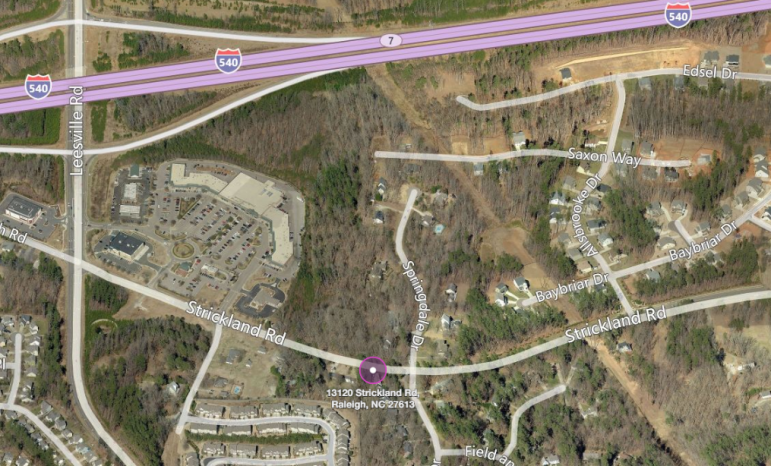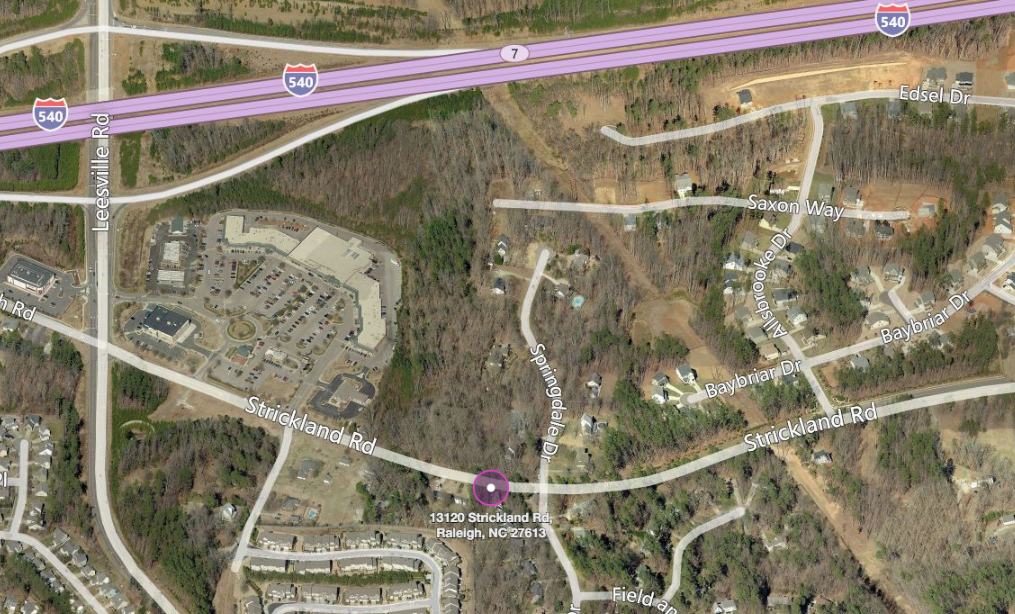Brought to you by Rufty-Peedin Design Build
Wednesday, June 8, 2016
Following a recommendation of denial from Raleigh’s Planning Commission last month, the first rezoning case of 2016 has officially been withdrawn.
Z-1-16 was a rezoning case that would have paved the way for a 64-unit town home development located within the Falls Lake Watershed in Northwest Raleigh. The local Citizens Advisory Council voted 126-24 against the case earlier this year and on May 24, the Planning Commissioners voted 7-1 to recommend City Council deny its approval. Eric Braun was the sole Commissioner to vote in favor of the case.

Bing Maps
An overview map of the area
At City Council on June 7, Planning Commission Chairman Steven Schuster told Councilors the case had been withdrawn by the applicant, NVR Inc.
While local land-use attorney Isabel Mattox was technically listed as the applicant on the zoning documents, she referred us to the property owner, Edna Saintsing Dillard, for questions on what the next steps might be. We left a voicemail at a number that may or may not have belonged to Dillard; if she gets back to us, we’ll update this post.
When presenting the case to Planning Commissioners last month, Mattox argued the conditions they would place on the property, such as limiting the impervious surface area to 23 percent of the gross site area, were more protective of the watershed than the 30 percent impervious allowed under the current zoning.

The Mattox Law Firm
Attorney Isabel Worthy Mattox
In addition to the impervious agreement, Mattox said they had also agreed to dedicate a minimum of 15 percent of the site to tree conservation, a minimum of 43 percent for forestation and agreed to treat 1-inch, as opposed to 1/2-inch stormwater.
“There’s other municipalities in the area with similar issues, that would like to permit some development in the watershed with a higher standard than what exists and that’s better than septic development,” Mattox said.
“I ask that you consider this, that you consider sending a message to City Council that the policy needs to be a little more nuanced, a little more thoughtful.”
Although Commissioners and staff were certainly thoughtful in their consideration of the project, discussing everything from the potential precedent-setting nature of the rezoning to the traffic and stormwater runoff issues the development could present for surrounding neighbors, in the end they chose not to go along with Mattox’ suggestion.
While significantly more rezoning cases are approved than denied — in 2015, Council heard 47 rezoning cases and approved 44 of them — what makes Z-1 more interesting than most was the decision to withdraw before Council even got the chance to deny it. Unlike quitting before your boss has the chance to fire you though, this was a pretty smart move on the applicant’s part.
Once a hearing date has been set and advertised, a request for withdraw essentially translates into a request for denial. When a rezoning case is denied, the applicant (or anyone else wishing to rezone the property) must wait two years (although it’s written in the code as “24 months”) before filing another request.
We reached out to a few members of the Planning Commission to see if they could clarify whether this 24 month restriction would apply for Z-1, as no hearing date had been set. We were told if we wanted a 100 percent solid answer, Assistant Planning Director Travis Crane was the man to talk to.
Fortunately, Crane was in attendance at last night’s City Council session, and one of the few to stick around to the bitter end of the three hour and forty minute meeting.
Despite sitting through what felt, to this reporter, like years of testimony about the wonders of Airbnb, Crane was more than happy to speculate — and then confirm on his iPad with a close reading of the relevant code — that the withdraw meant no waiting period for a new rezoning application.
Crane said he hadn’t heard about any plans to refile the case, and that even if the applicant did so, they would face the same problems they had the first time around.
Chairman Schuster in a brief interview with The Record echoed a similar sentiment.
“My sense, if they wanted to refile, they’ll probably need to make some substitute changes” if they wanted the case to receive a recommendation from the Planning Commission, Schuster said.
While a recommendation of denial from the Planning Commission doesn’t necessarily mean a project won’t be approved by Council, Councilors did recently reject a similar town home development case, Z-34-13, which presented a number of the same problems Z-1-16 did.

Travis Crane
Both projects called for increasing residential density to allow for a town home development, and the major concerns for both were the stormwater runoff and traffic impacts it would potentially have on the surrounding properties. It should be noted that when we presented this comparison last night to Travis Crane last, he completely disagreed.
“The biggest issue with Z-1 was that it was in the watershed,” Crane pointed out, adding that Z-34 had faced myriad problems during its long, slow journey to denial. I’m inclined to agree with him, but I still think my comparison has some merit.
A mantra I’ve heard more than a few times from City staffers when it comes to the current stormwater runoff problem (and it is a problem: for example, try walking around downtown during or after a heavy rainfall; the streets & sidewalks are turned into miniature rivers and lakes) is that we’re all paying the price for “the sins of the past,” a past when there wasn’t much in the way of long-term infrastructure planning to deal with a seriously marked increase in impervious surface area.
While applicants for both Z-1 and Z-34 proposed stormwater controls beyond what would have been required under the existing zoning, this was not enough to persuade Councilors to approve Z-34 and it’s possible Mattox or one of the other parties involved with Z-1 saw the writing on the wall and figured a withdraw now was much better than a denial later this month.
Not only will the withdraw make it possible for the current development team to tweak the rezoning request, it also makes the property easier to sell off, because the new owner wouldn’t have to wait two years or file a special request in order to rezone it. We’ll be sure to keep an eye on it: it would certainly be unfortunate if it was developed under the existing zoning in such a matter as to create more problems than Z-1 would have, but only time will tell.
